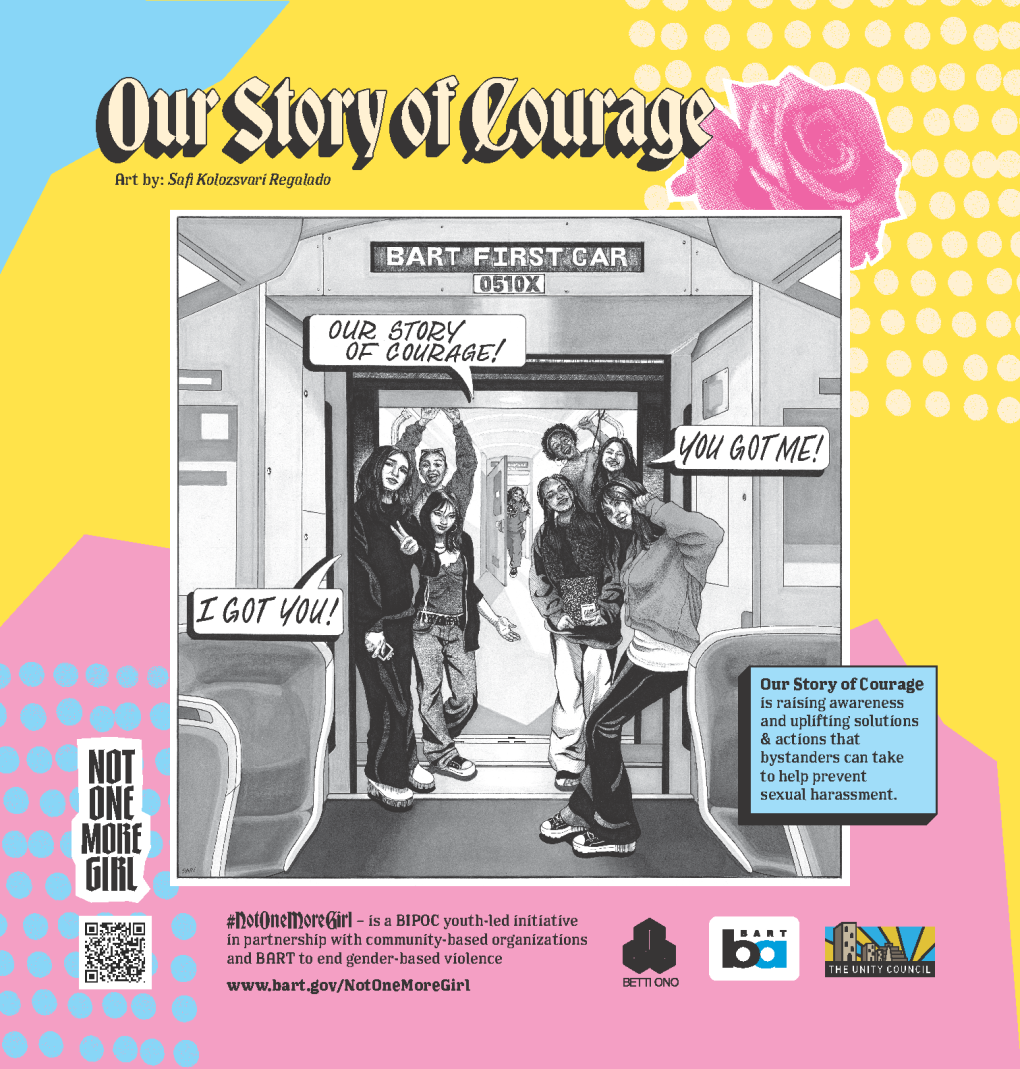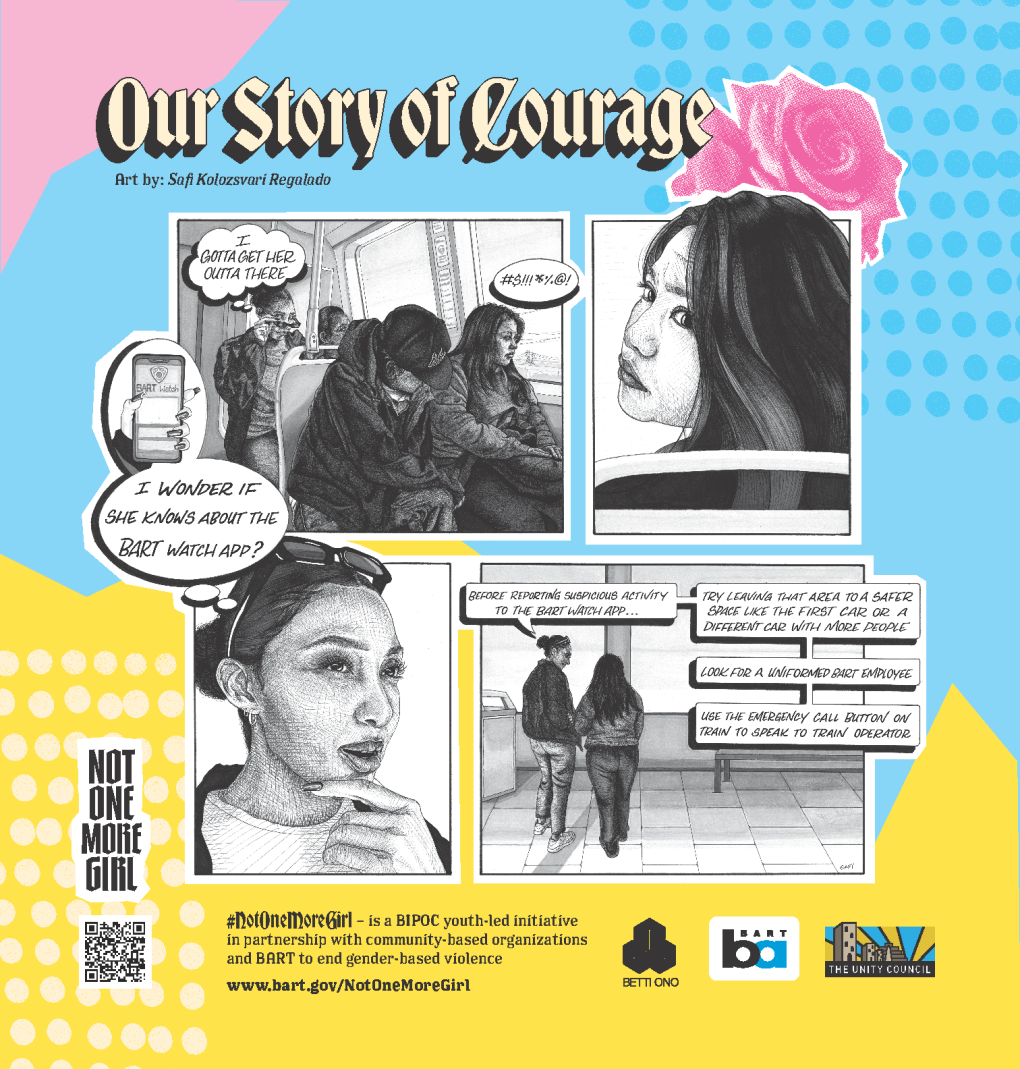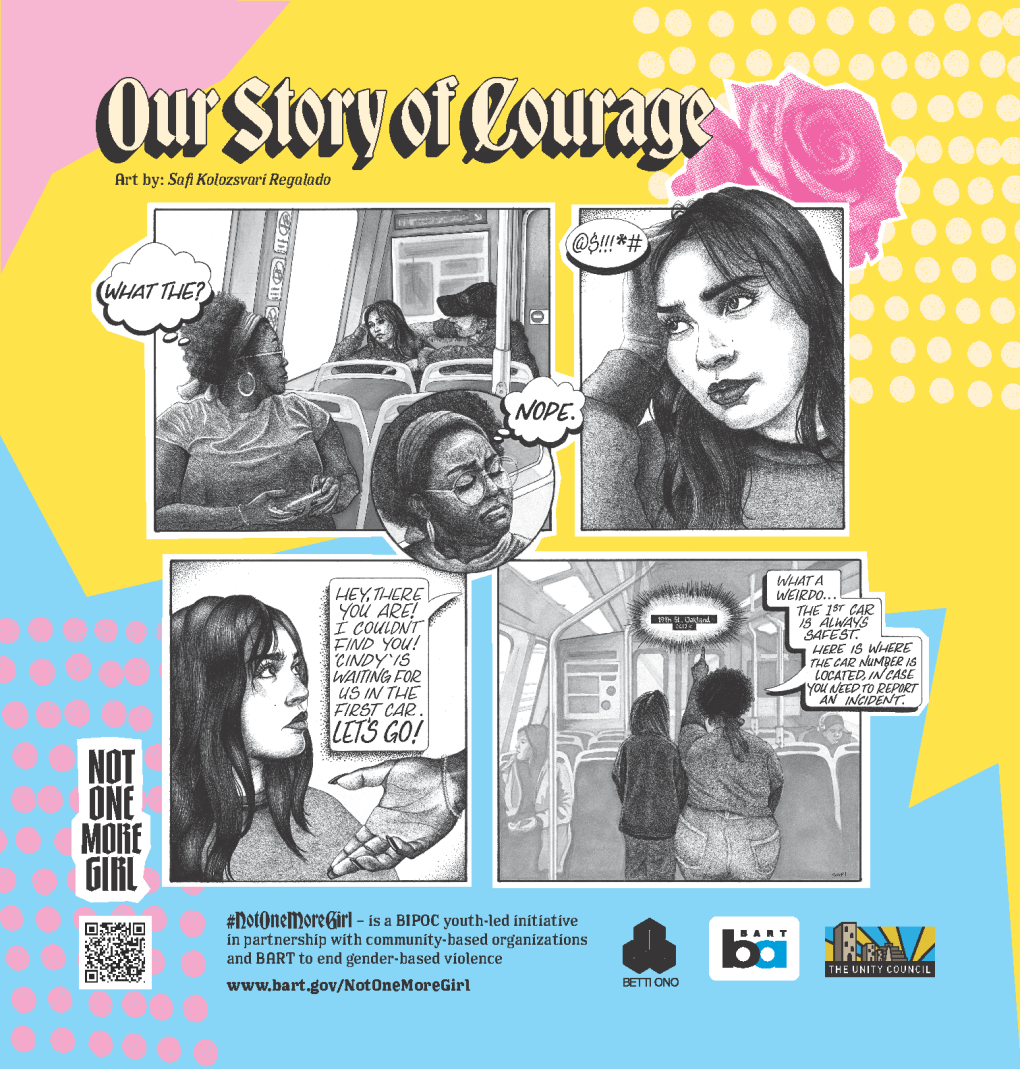
The groundbreaking, youth-driven Not One More Girl initiative that addresses sexual harassment and gender-based violence on BART expanded with the launch of Phase II in August 2023 with new strategies to build a culture of supporting girls* when riding transit. Read about Phase I of the campaign.
*“Girls” refers to gender-expansive youth (cis girls, trans girls, non-binary youth, gender nonconforming youth, gender queer youth and any girl-identified youth).
Not One More Girl is a BIPOC youth-led initiative in partnership with community-based organizations and BART to end gender-based violence. The second phase of the award-winning initiative places emphasis on enabling people to have a greater sense of empowerment in a harassment situation and exhibits tools that fellow riders can use to provide support when harassment occurs.
The new tools being offered to the public are the product of a partnership between BART, The Betti Ono Foundation, and The Unity Council’s Latina Mentorship and Achievement Program, who worked together to engage local high school and college students about their experiences on transit and their ideas for action-based strategies to enhance safety and support people experiencing sexual harassment on transit.
The approach for the second phase of Not One More Girl is to deepen the reach and impact of the ongoing work to increase safety at BART.
The Betti Ono Foundation, led by Anyka Howard, developed an Arts & Civic Engagement Fellowship, offering paid opportunities for transitional-age youth (ages 16-24) to guide this phase of the initiative and to amplify the voices of BIPOC and gender-expansive youth. The fellows attended design workshops in Spring 2023 and curated the theme, “Our Story of Courage,” for this phase of Not One More Girl to educate the public about safe bystander intervention as a method of preventing and interrupting harassment and other safety tips for riding BART.
Listen to our podcast about Not One More Girl.
Si te acosan en un tren o en
una estación
Phase II includes:
- 3 distinct art posters outlining safety tips.
- New bystander intervention cards are now available to riders to discreetly pass to people to prompt bystander intervention actions and report harassment when it is taking place.
- These cards are now available at all Station Agent booths and are being distributed by community partners.
- View a PDF of the "I Got You" bystander intervention card.
- View a PDF of the "You Got Me?" bystander intervention card.
- Beginning September 11, 2023 BART will size trains for safety and run shorter trains to eliminate empty cars, where girls fear being targeted for harassment and assault. The schedule change also increases service on nights and weekends, so riders spend less time waiting on platforms.
Moving forward:
- BART will work with the Alliance for Girls in fiscal year 2024 to develop a youth-informed BART rider safety evaluation framework, as it pertains to sexual harassment, to define safety metrics and evaluation strategies that will guide BART’s preventative and interventional safety efforts.
- BART will develop and roll out training for frontline staff to give them tools on how best to handle situations involving riders experiencing trauma from harassment and gender-based violence, with a special focus on engaging marginalized community members.
Empowering Local Girls
“A big part of harassment is the devaluing of another person,” said Karol Suarez, a senior at Oakland School of the Arts. “And in this culture, we often don’t value people’s voices, especially women, especially women of color.”
This past spring, Suarez served as a youth fellow guiding this latest phase of Not One More Girl and helped develop the theme, “Our Story of Courage.”
“This project understands the importance of making people feel comfortable on public transit, a place that is meant for everyone,” said Suarez. “Being a part of this has made me hopeful; it shows me we’re not that messed up as a society. Even this small group is making a big impact.”
The Unity Council, under the leadership of Gabby Guzman, helped connect BART with youth and offered social-emotional support to the fellows throughout the process.
BART’s Chief Communications Officer Alicia Trost and BART Art Program Manager Jennifer Easton led the effort for BART and began the process of internalizing the initiative at BART to involve frontline workers, including Station Agents, Train Operators, Ambassadors, and Crisis Intervention Specialists.
The Not One More Girl initiative first launched in 2021, and rider survey data has indicated the project is helping reduce harassment and improve the perception of safety on BART. The launch of the second phase of the initiative coincides with BART boosting its safety presence on trains as a direct response to rider concerns.
New Art Posters to Educate the Public
The latest phase includes a powerful new art campaign by local artist Safi Kolozsvari Regalado that will appear throughout the BART system, including onboard trains and in stations. Regalado worked with youth fellows to conceptualize and design the artwork, which was inspired by the long tradition of Chicano-style ballpoint pen art. The posters depict steps people can take if they witness or experience harassment and promote the use of the BART Watch app for reporting, Train Operator call boxes on every train car, and suggestions, such as sitting in the first train car near the Train operator.
Oakland-based artist Mike Nicholls brought a cohesive graphic art design to all Phase II collateral and digital media assets for the campaign.
Scroll down for survey results measuring awareness and effectiveness of the posters. It is listed after the artwork images.
Bystander Intervention Cards for Riders
Two distinct wallet-size cards are now available to riders to discreetly hand to people to signal they need help or support, or to notify someone being harassed that you are there to help and support them.
These new bystander intervention cards are a concept developed by the youth design team, who expressed the need for options when asking for help or approaching a situation of potential harm. The cards include the slogans “I Got You” and “You Got Me?” with a list of actionable items riders can take to help a situation, from reporting the harassment to simply standing with someone. As young people are still trying to find their voices and figuring out how to navigate and decipher harassment, a physical card you can hand someone is an effective tool to precipitate the shift from being a bystander to becoming an agent of change.
The cards are available for pick up at each Station Agent booth at BART, and Ambassadors and Crisis Intervention Specialists will carry the cards and give them out when engaging riders. BART and the Betti Ono Foundation will also work to distribute the cards to youth through community organizations, events, and schools.
Bystander Intervention Card Version 1: "You Got Me?"
Front side and back side:

Bystander Intervention Card Version 2: "I Got You."
Front side and back side:

Sizing Trains for Safety
During youth and public engagement, BART was frequently asked to have a “women’s-only car.” There was also feedback that when train cars are empty or near empty, it makes girls feel less safe as it encourages anti-social behavior and targeted harassment and crime. While segregated spaces in train cars are in use in several countries around the world, it has not been embraced in the United States and would be nearly impossible to enforce. Instead, BART recommends people who feel unsafe sit in the first car near the Train Operator.
Beginning September 11, BART will begin to reduce the likelihood of empty cars by running the typically least crowded trains shorter. The concept of active spaces as safe spaces will help enhance the safety of all riders and will increase the presence of BART safety staff as there will be fewer cars on each train.
Framework to Evaluate Safety Metrics
In the coming year, BART will work with the Alliance for Girls, one of the original leads of Phase I of Not One More Girl, and Evaluation Studio to develop the first youth-informed evaluation framework focusing on rider safety as it pertains to sexual harassment and assault prevention and intervention on BART. Rooted in how girls and gender-expansive youth define safety, in Alliance for Girls’ Radical Visions of Safety research report published in 2021, the framework will draw from learnings, input, and recommendations from youth themselves on how BART can best collect data and measure impact of its initiatives to create actionable and effective policies and processes around sexual harassment and assault intervention.
Model for Other Transit Agencies
Not One More Girl, first launched in April 2021 in collaboration with Alliance for Girls, the Betti Ono Foundation, Black Girls Brilliance, and the Unity Council’s Latina Mentorship and Achievement Program, is recognized within the transit industry as a model for other agencies to follow to address sexual harassment and assault through a community-led process. The actions BART took during the first phase of the initiative are now considered best practices for working with youth, cultural strategists, and community partners to tackle sexual harassment in a space outside of law enforcement.
In 2022, SB 1161, authored by Senator Dave Min and sponsored by Stop AAPI Hate, was signed into law requiring the Mineta Transportation Institute at San Jose State University to create a survey tool to be made available to California transit agencies to measure rider demographic information and experiences with safety, including street harassment on transit. Phase I of BART’s Not One More Girl initiative was cited as an inspiration for the legislation, and in 2023, BART volunteered to be a pilot agency for the Street Harassment on Transit Survey being developed.
Cultural Strategy to Disrupt Harm
Not One More Girl uses youth participatory action research, cultural strategy, art, and policy change to create means of empowerment and dismantle the systems that have enabled gender-based violence and harassment. The project recognizes inequities in specific communities that are more often impacted by the intersectional issues of race, class, gender, and ability.
Quotes from leaders of Phase II of this Initiative:
Anyka Howard, founder and CEO of the Betti Ono Foundation:
“We recognize that talking about these issues with the public is going to challenge the status quo, it’s going to challenge norms, and it’s going to challenge our culture – in the Bay Area and beyond. This is a shared issue and experience that affects not only those targeted, but also the people perpetuating that harm, as well as the people who witness it, hear about it, or see it. We want to break up these harmful systems and replace them with a worldview of humanity. Our goal is to evolve and transform the culture of ridership on BART, and through this project, other transportation systems.”
Gaby Guzman, Latinx Mentoring and Achievement Coordinator of Youth Services with The Unity Council:
“Youth, especially BIPOC girls and gender-expansive, voices are consistently silenced, particularly when speaking on issues impacting them. They experience overlapping and concurrent forms of oppression, such as adultism, racism, sexism, misogyny, homophobia, and transphobia (the list goes on), which creates a challenging environment for youth to navigate, especially in transportation. Youth leading this conversation is essential. Empowering them to take up space and to use their voice will not only support the overall goals of Not One More Girl but generate a sense of transformative agency in their own lives.”
Safi Kolozsvari Regalado, Betti Ono Artist-in-Residence, San Francisco based artist:
“I hope that the realness of this campaign and my artwork help the viewer relate to the illustrations and maybe even see themselves or someone they know in them. All my work is done by hand, and every person in the campaign artwork are actual members of the community – the girls were all high school students in Oakland, for example, and the Train Operator is a BART Train Operator. I’ve enjoyed comic art since I was a kid, but I landed on the comic aesthetic for this project because of the feedback I received from youth in our design workshop. They said it would be cool if I could give the girls and women depicted in the artwork a sort of superhero quality, and my mind instantly went to comics.”
Franchesca Rodriguez, Betti Ono Transit Justice Community Engagement Facilitator and graduate student at UC Berkeley’s Department of City & Regional Planning:
“My journey into transit justice has stemmed from witnessing transformative power by providing young people with the tools they need to succeed, including advocating for a safe and reliable transportation system. I wanted to be a part of Not One More Girl because I believe that the safety and security of every individual should be a nonnegotiable priority. We are and have been at a pivotal moment in our society where women, girls, and gender-expansive youth cannot confidently say they feel safe using public services to get from point A to point B. Not One More Girl is a call to create a world where women, girls, and gender-expansive youth can freely move without fear or deep hesitation while using public transportation.”
Alicia Trost, Chief Communications Officer at BART:
“As BART is working to rebuild ridership and gain trust within the communities we serve, focusing on the safety of girls helps us explore ways to improve the safety for all riders. When speaking to students during this phase of engagement, we frequently heard the youth had never used BART because their parents wouldn’t let them. It gets to the deep-rooted fears people have about transit. As mobility providers, we must do better. We can’t be successful if we can’t meet the basic needs of our most vulnerable riders. This work is pivotal for ridership recovery as we reimagine service and roll out new data-driven approaches to safety.”
Jennifer Easton, Art Program Manager at BART:
“The ability to craft this initiative with artists playing a key role in giving voice to the work of the youth and to bring the message to our community of riders is a central tenet of the BART Art Program, which brings artists to the table as problem solvers. Whether the question is rider safety, enhancing station environments and access, connecting with local communities, or looking at sustainability with a creative lens, artists can serve a critical role in delivering important solutions for transit. Collaborating on the Not One More Girl initiative with community partners that understand the importance of art as a tool for achieving the critical goals around safety for girls demonstrates the value of nontraditional strategies.”



Measuring the Effectiveness of Phase II Posters
To measure the change in awareness of gender-based harassment and understand the impact of Phase II of the Not One More Girl campaign on BART riders, BART conducted an online random sample survey between October 26, 2023, and November 6, 2023. 7,598 current riders were invited to participate in the survey via email and 1,997 responded (26% response rate).
- 30% recalled seeing the posters
- 49% said they are more aware of sexual harassment/gender-based violence (GBV)
- 55% said they know what to do if they witness sexual harassment or GBV on BART
- 47% said they know where to get help if they experience sexual harassment or GBV on BART (the poster that advises reporting inappropriate behavior on BART Watch scored the highest at 51%)
- 44% said they know more about sexual harassment/GBV impact on girls, transgender and gender non-conforming people on BART
- 28% feel safer riding BART
- Based on demographics: posters successfully increased awareness among male, non-white, younger, and lower income riders
- Females, POC, younger riders are more likely to experience gender-based harassment
What riders recalled about the posters
- Don't hassle women?!
- Women Safety Suggestions
- The anti-sexual harassment comic
- Unacceptable behavior
- Story about us
- Our story of courage
- Sexual harassment (help a friend)
- The one about helping the girl that needed help